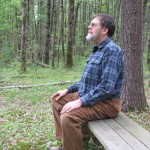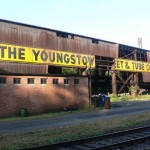I saw a young man walking by the side of the road yesterday.
He had a fey quality to him, and I felt I instantly recognized something in him that I’d seen before: a kind of tentative joy and relief, the sort that’s felt by the misfit adolescent who finds himself suddenly furloughed from the old routine of being shoved into lockers by thuggish peers or of hiding the humiliation of being the smartest boy in school who doesn’t know what to do with something as ungainly as loneliness and desire.
He reminded me of many nameless young Pagans, young men especially, that I have known. And, seeing him bounding lightly over the snowy sidewalk across the street from me, I couldn’t help but grin in delight just to see him there.
Just as I grinned, the young man glanced up and saw me; he grinned back, began to wave a cheery greeting, and then, a heartbeat later, with a hitch in his step, brought his hand back down.
It could not have been clearer if he’d shouted it, his unspoken thought: “Do I know you?”
No, no, you don’t know me. Even if my hasty impression of you is right, and you are a Pagan, you wouldn’t know me today. My days of active community work and leadership seem to be behind me now.
It was a smaller Pagan community in which I came into my spiritual adulthood, one in which we still imagined we could all know one another’s names and hearts. I was in my prime when I married Peter and moved to Massachusetts, and it was at that Yule almost twenty years ago where I first felt that sense of being a young family, standing at the bright, warm heart of things, at the first local ritual we went to with my daughter. I wonder if she remembers it at all? Casual pick-up drumming in the kitchen, endless platters of potluck food, sleepy children in laps and overstimulated ones racing through rooms thronged with people.
Then the call to ritual. An enactment of the season: As we stood round, in the center of a room now darkened except for candles, one child walked into the circle holding a box. Solemnly, dead, dry autumn leaves were placed inside the box, and that child’s father, with antlers on his head and a copper sun between the tines, bowed to touch the box once…twice…three times with his antlers.
The box was opened, and lo and behold, the dry dead leaves had become green and living. Yule was come, life was returning, and we all joined in the songs.
On the way home, my daughter fell asleep in the back of the station wagon, and Peter and I were still wrapped in the soft glow of candles.
We were young, but grown. We were parents, but parents of a young child. Everything was ahead of us then. Traditions were still fluid and in formation, and understanding seemed to sprout and grow like the greenery in the magic Yule box. Our job and our pride was to share them, to gather the scattered children of the goddess for ritual and study and potlucks and community. Our passion was participating in and shaping and invoking the mystery of Pagan community. And it was good, and warm, and it did seem as if it would last forever.
Time passed. We became the leaders of a coven, hectic and always planning. Our child stopped being the girl with a rag doll who sucked her thumb, and became a teenager, familiar with music we’d never heard, organizer of sleepovers and parties and a gang of friends who seemed immortal.
It deepened us in community to watch her reshape our traditions to fit herself. By the time she entered college and her friends scattered, I was teaching school, exhausted on a Yule eve that often fell on a school night. It was wonderful to watch her take charge of the traditions. “Come to our house,” she told all her friends. “We always have cinnamon buns. You can help me make them. You can decorate the tree.” And they did, and the house became so full of singing, laughing, cooking, decorating girl-bodies that there was hardly room to turn around. At times, I thought my head would explode from all the chaos and the heat and the noise.
Outside, the winter air was cold.
But I loved it. (There is that. At least I had the wisdom, even then, to know I loved it.)
But this year, my daughter will not join us in decorating our Yule tree. For the first time, her life’s course has taken her away from us on that particular night.
We are adrift, Peter and I. We are no longer the young leaders of community, and we are no longer the wise parental figures at the sidelines.
We’re just middle-aged, our parenting behind us, both in the Pagan world and in our own family.
It’s almost Yule. And I am old, and cold, and a little sad. I recognize the joyful step of youth, but youth does not know me, any more.















